In 2008, China invested something around US$40 billion in the Beijing Olympic Games. The result: an amazing spectacle that worked as a showcase of the new China to the Western world; China literally showed itself to the world. Two years later, it’s the world that shows itself to China. The 2010 edition of the World Expo (a global event held in London for the first time in 1851 under the title World’s Fair) is being held in Shanghai, and will continue until October 31. This time, the investment is US$45 billion.
Chinese girls walk around the National Stadium in Beijing
Commemorative song produced for the 100 days countdown to the Beijing Olympic Games (2008)
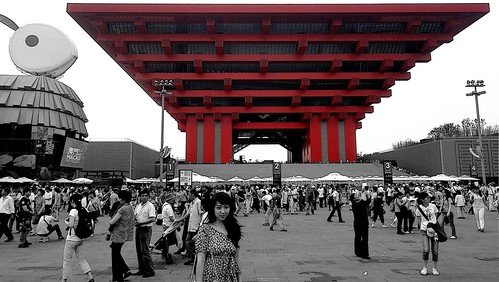
Visitors around the Chinese national pavillion, in the World Expo 2010
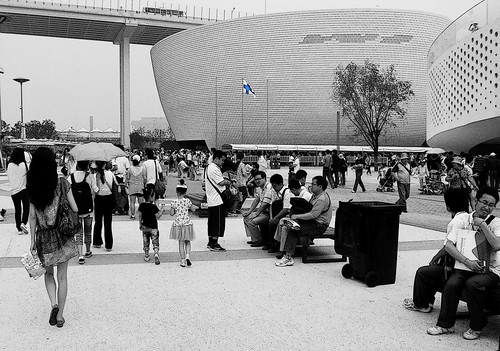
Visitors in the European area of the World Expo. In the background, the Finnish national pavillion
Promotion video for the World Expo 2010
What do these two events of global proportions – the Olympic Games and the World Expo – say about China? First, they are not afraid of investing. Second, they are willing to embrace the world – and, consequently, the western consumption standard, from McDonald’s to BMWs. Moreover, it already happened. The Communist China, as the older generations used to imagine, doesn’t exist anymore. This is pretty clear to see, for example, when entering a shopping mall in big cities like Beijing and Shanghai. There, it’s difficult to tell if you are in China or United States, both for the signs written in English as the crowded Burger King in the corner.
The realization of these events, especially the World Expo, also shows that the world’s eyes are looking at China, and very carefully. This is not a new phenomenon, of course. Eyes turned to China stimulated many centuries of commerce during the time of the Silk Road. Later, it was the desire to reach India and China that stimulate the European navigators to launch themselves into the sea. Once again, after the death of Mao (during the 70s), and the economic opening promoted by Deng Xiaoping during the following years, China is reborn as a land of opportunities.
Opportunities that Shanghai represents very well for being a hybrid city that mixes the old and the new, and also the East and the West. That’s why Shanghai intends to be the next global capital of the 21st century. The realization of the World Expo on the river banks of the Huangpu is one of the cogs turning in that direction.
The realization of these events, especially the World Expo, also shows that the world’s eyes are looking at China, and very carefully. This is not a new phenomenon, of course. Eyes turned to China stimulated many centuries of commerce during the time of the Silk Road. Later, it was the desire to reach India and China that stimulate the European navigators to launch themselves into the sea. Once again, after the death of Mao (during the 70s), and the economic opening promoted by Deng Xiaoping during the following years, China is reborn as a land of opportunities.
Opportunities that Shanghai represents very well for being a hybrid city that mixes the old and the new, and also the East and the West. That’s why Shanghai intends to be the next global capital of the 21st century. The realization of the World Expo on the river banks of the Huangpu is one of the cogs turning in that direction.
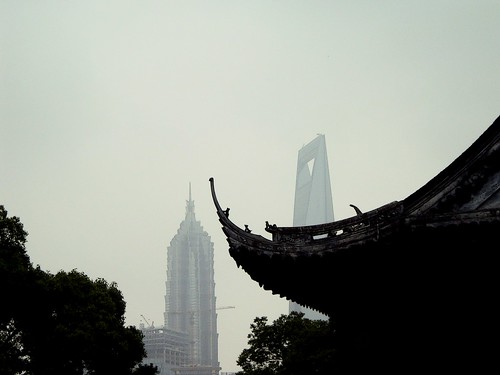
Shanghai: a hybrid city that mixes the old and the new
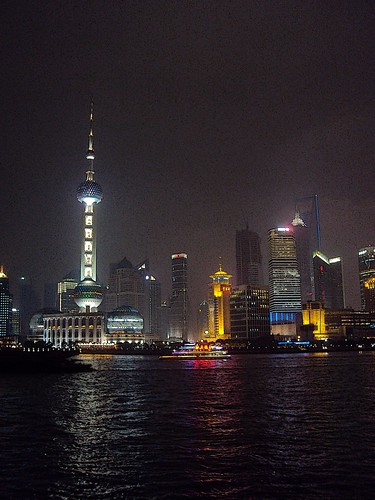
The city that intends to be the global capital of the 21st century
Today, there’s a lot of foreigners living in China, even though the majority is obviously formed by Chinese. It’s easy to be the majority when you are a nation with almost one and a half billion citizens. However, despite the fact that western visitors – and residents – are not something new, the Chinese people are still curious about the foreigners. If you are going there, and, just like me, you have your origin declared by a Western appearance, be prepared for a lot of staring in the subway, often followed by indiscreet comments. Even though the Chinese population is divided in 56 ethnic minorities, its majority (more than 90%) belongs to only one ethnic group, which is called han. Namely, the Chinese people are less used to diversity than the Brazilian, for example. In this sense, China still has a long way to go before embracing the world, as it has been trying. (G.P.)

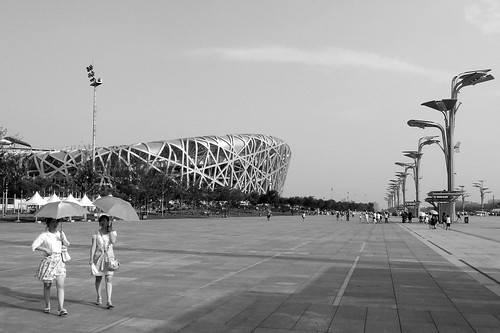

Agree. They have a long hard road to understand how different people from other cultures are. Same here, when I tell the history about Amy in the church, people can't understand how someone doesn't know Jesus. However, culture is culture. Who holds the true truth?
ResponderExcluirI like your views.
ResponderExcluirAlso i agree with your ideas.
People stare at foreigners because of curiosity, sometimes because they think that you are more beautiful~
haha, however,
sexy!
ELSA
Oh~~~~
ResponderExcluirmy lady gaga~~